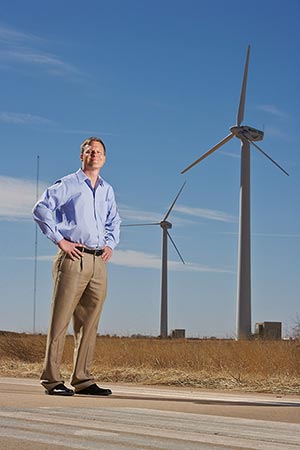John Schroeder
2014 Texas Tech Integrated Scholar
Director of the National Wind Institute
Professor of Atmospheric Science
College of Arts and Sciences

I still love being in the field. If I spend a day taking measurements from a hurricane, severe storm or even wind farm, my passion is reignited.
The roles of an Integrated Scholar have come naturally for atmospheric science professor John Schroeder. His focus is on all things wind at Texas Tech. His research, which involves analyzing the wake patterns caused by an array of wind turbines, aims to improve the performance of wind farms, so they may yield greater amounts of energy at more affordable rates. In the area of wind engineering, Schroeder has also made notable developments with his publications and technologies. He has led the development of dual Doppler Radar platforms, the WEMITE instrument towers, Stick-Net probes and mobile mesonets to document the wind and inner workings of hurricanes, tornadoes and severe weather events. As director of the National Wind Institute, Schroeder works to recruit faculty from various colleges and departments to collaborate on the institute's projects. Interaction with colleagues across campus has proven valuable and strengthens the interdisciplinary essence of research in wind science. That approach also carries over to the classroom, and Schroeder is a champion of academics with a multidisciplinary format. As a result, Texas Tech's bachelor's program in wind energy and doctoral program in wind science and engineering stand out because of their foundational curricula and industry-centered research perspective.
Learn more about Integrated Scholar John Schroeder in this question-and-answer session.
What are your research objectives and interests?
One of my ongoing research objectives is to help obtain the foundational information necessary to enable system-level control of wind plants, leading to enhanced performance. Our contribution is through the development of new technologies and techniques to measure the complex flows across wind plants. This enables the identification of turbine-to-turbine interaction.
How do you feel your research impacts the globe?
Enhancing the performance of new and existing wind farms leads to more energy at a lower cost.
What types of service projects have you been involved with?
I serve as the director for the National Wind Institute, served on countless department and university committees, and take pride in mentoring young faculty.
What are you currently working on?
I am working to bring faculty from across the university together around the common themes associated with wind. These including wind energy, wind science, wind engineering, etc. This sounds easy, but includes breaking down barriers to interdisciplinary research and education.
Where do you find your inspiration?
I still love being in the field. If I spend a day taking measurements from a hurricane, severe storm or even wind farm, my passion is reignited.
What advice do you have for new faculty members about balancing the components of Integrated Scholarship—teaching, research and service—in their careers?
You have to do it all, so reach out to the successful colleagues and ask for their constant guidance. I was almost always blessed with great mentors throughout my career.
Scholar Background
When I was an undergraduate student, one professor profoundly impacted my career by opening my eyes to the opportunities and my potential. By the way, that one professor was one of the founding fathers of the Wind Center at TTU!
B.S., Civil Engineering, University of Missouri-Rolla (1994);
M.S., Atmospheric Sciences, Texas Tech University (1997);
Ph.D., Civil Engineering, Texas Tech University (1999)
Office of the Provost
-
Address
104 Administration Building, Box 42019, Lubbock, Texas 79409-2019 -
Phone
806.742.2184 -
Email
provost.communications@ttu.edu
